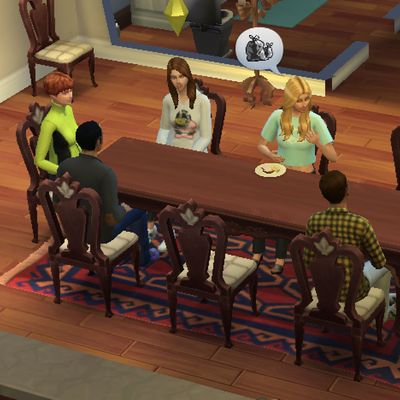
I didn’t have a lot of friends as a kid, for reasons that will become clear in the next sentence. I was, to put it gently, an indoor kid, the kind of child who was convinced I was dying when my heart sped up during soccer practice. I mostly saw my clumsy, dumb human body as a mere vessel for my frenzied imagination, which was my favorite place to hang out. When I discovered the first iteration of The Sims, a PC game wherein I was allowed to build fake people and move them into fake homes and make them do whatever I wanted, I made the final transition into a brain in a vat. No longer did I have to attempt to socialize with the girls at school who made fun of my enthusiasm for the Sweet Valley High series. I’d sit in front of my parent’s blocky, hot-to-the-touch Dell monitor, gleefully losing myself inside the Simulation.
But after a few rounds of feeding my Sims, encouraging them to bathe on a regular basis, directing them to the bathroom when they began clutching their groins and hopping up and down, pairing them up with their attractive neighbors, instructing them to “woo-hoo,” impregnating them, and helping them raise a baby in a nurturing environment, I became bored with their happiness. The game really only became interesting when the Sims were despondent. I started creating elaborate story lines involving affairs, divorce, incest, murder, arson, demented landscaping, pools without ladders, and excruciating home décor. My real life was dull and predictable; I wanted to imagine what it would be like to have a life full of chaos and supernatural visitations. Drunk with power and control for the first time in my short life, I was no longer interested in world-building, only world-destroying, the Thanos of my parents’ sluggish PC.
Eventually, I became scientifically interested in tequila and grew out of The Sims. But as I grew away from my Sims, The Sims only grew stronger, becoming the most successful PC-gaming franchise ever, with expansion packs, sequels, and hundreds of millions of copies sold to control-freak children and adults alike. So The Sims were still there, patiently waiting for me, when it came time to quarantine. When I redownloaded the game, I assumed it’d be business as usual for me and my made-up friends: drownings, self-immolation, incontinence. But I realized that as the world around me fell to shit, what I really wanted was simulated quotidian life.
The first thing I did, almost without thinking about it, was re-create my entire family, whom I haven’t seen since December. I built my dad from the ground up, complete with his little gardening shoes and his love of classical music. I put my mom in a green fleece and leggings, imagining her heading off for a run and coming back with a random knickknack she’d picked up at an estate sale. I dressed my 17-year-old sister in a big, cozy sweatshirt and gave her the musical talent and extreme self-assurance she has in real life. My younger brother, who lives far away, in Berlin, got a strong dose of his real-life counterpart’s “outgoing demeanor” and a “love of nature.” And my other sister got her love of space. I even made myself, except hotter.
Then I rebuilt my childhood home in suburban Chicago, where my parents still live, and where they receive daily text messages from me alternating in tone from “desperately sad” to “vibrating with fear” to “rude,” because I’m terrified that I can’t do anything to keep them safe right now other than bully them from across the country. I got frustrated when I couldn’t find the right windows to look out onto my dad’s sweet fledgling vegetable patch. I gave up on finding a duplicate of our old Oriental rug. I did not leave enough room for the big, beautiful tree that a tiny tornado knocked down in our front yard years ago. But I carefully laid out each room to the best of my memory: our overstuffed living-room bookshelves, my mom’s cluttered office, my sister’s 12,000 wet towels strewn about the bathroom, the family room where sometimes we sit and play the piano and sing Ariana Grande’s “Honeymoon Avenue,” a song about how a relationship is like a car.
On March 22, as Governor Cuomo asked New York City to go on “pause,” I moved my family into their house. I watched them approach each other, begin to joke and laugh. At one point, my Sim dad hugged my Sim sister. I felt a sharp, brief pain in my chest, wondering when I’d be able to hug my real dad again. I can’t cook at all in real life, but my Sim made my family a nice little meal and we all ate it together around our dining-room table, chatting cheerfully about the weather. And when my family got tired, I gently directed them all to their bedrooms, where they climbed safely into their beds and went to sleep.


